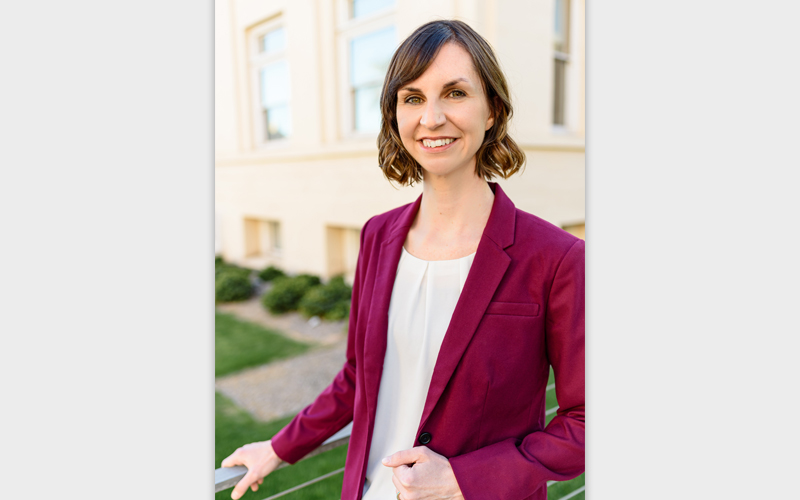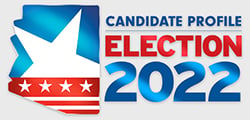
Kathy Hoffman (Photo courtesy of the Kathy Hoffman campaign)

Political affiliation: Democrat
Position sought: Superintendent of Public Instruction
Age: 36
Career: Preschool teacher, speech pathologist
Website: electkathyhoffman.com
When Kathy Hoffman campaigned four years ago to become Arizona superintendent of public instruction, the race was all about school funding, supporting teachers and keeping education in the hands of educators.
This time around, the campaign carries the overtones of a culture war. Hoffman, the incumbent, faces former schools superintendent Tom Horne, a Republican.
Horne has made such flashpoint topics as critical race theory, parental oversight of curriculum, sexual orientaton and LGBTQ issues the centerpiece of a campaign that “marks a test of how a swing-state Democrat might hold onto their office as the Republican Party increasingly builds an offensive on reshaping education,” according to a recent article in Politico.
The outcome likely rests in the hands of independent voters, who make up about one third of the electorate.
Hoffman formerly was a preschool teacher and speech language pathologist. She was propelled into office by the RedForEd movement, which included a teacher walkout in 2018 in support of higher pay and more K-12 funding. She was the first educator to lead the Arizona Department of Education in more than 20 years.
During her time in office, she has worked to attract and retain qualified teachers and invested in programs to support student mental health. During the pandemic, she came under fire for supporting masking rules in opposition to Gov. Doug Ducey.
Her campaign had raised about $146,000 by the end of June, compared to Horne’s $550,000.
Hoffman said she will continue to focus on reducing class sizes and increasing teacher pay and student mental health services. She also said she will continue to support LGBTQ+ students, including providing an internet space called Q Chat, where queer and LGBTQ students can discuss issues.
During a September debate aired on Arizona PBS, she said Horne’s “attacks on the LGBTQ community are strictly political. … If we want our state moving forward, let’s be supporting public education, including making our schools safe and inclusive for all kids, including our LGBTQ youth.”
Q: Why are you interested in this job?
She said she was inspired to run by Betsy DeVos, a politician and philanthropist who was U.S. Secretary of Education from 2017-21. DeVos made her realize “how much we need educators to be running for offices like the Arizona Superintendent of Public Instruction,” she said.
Q: What in your past work, political or volunteer experience makes you the best candidate?
Hoffman said her experience as a teacher and speech pathologist is important for someone who leads the Department of Education.
And since becoming a mother, she said, she has gained an added perspective about what parents and children need and deserve.
Finally, Hoffman said she has gained insights during her time in office, particularly from visiting schools across the state. “I personally saw what the implications are for students and educators when state laws are passed,” especially in underserved communities.
Q: What are the major issues facing Arizona schools?
Teacher shortages “continue to be a significant challenge for our school leaders and their ability to deliver high quality and highly effective instruction to our students,” Hoffman said.
According to her website, Arizona has more than 1,700 open teaching positions, and more than 750 teaching positions are being filled by long-term substitutes.
Arizona also has the worst school counselor-to-student ratio in the country – at a time when students need more mental health support than ever, she said. Adding counselors and social workers to schools has a ripple effect, she said, because it helps teachers support students.
The Legislature also needs to do more to fund public education, she said.
“During the recession, Arizona cut more from public education than any other state in the country. We are still recovering from those cuts.”
Q: What will be your top priorities if elected?
“The focus will be on educator recruitment and retention,” Hoffman said, adding that she will build on programs she already has started, such as a teacher residency program that prepares recent college graduates from any degree program and mid-career switchers to be teachers.
“We’ve also invested millions of dollars in federal funding towards teacher mentorship, especially for new teachers. It’s often in the first couple of years that (teachers) need the most support.”
She contrasted her priorities to those of Horne, who has campaigned on banning the teaching of critical race theory – a college-level academic theory that systemic racism is built into American institutions, and which is not taught in Arizona K-12 schools – and removing Q Chat access.
“Our students deserve to learn about race and gender issues in a way that is accurate, in a way (that is) empathetic to people who have different backgrounds than themselves.”
Q: How will you work to improve bipartisanship through your position?
Hoffman believes there is potential for bipartisan support for expanding preschool and full-day kindergarten.
“It’s our families and parents that have hardships when they can’t find child care.”
In the Arizona PBS debate, Hoffman said she has been working in a “bipartisan way with the Arizona Legislature to expand our school safety grant program, which has added tens of millions of dollars of state funding.”
Q: Do you have any concerns about the security of our elections?
“I do not.”
Q: What is a personal challenge you need to overcome?
Hoffman said she has had to “overcome some of the stereotypes about what leadership experience looks like.”
Q: Please share a quote or advice that you live by.
During her first year in office, a journalist asked her, “Have we knocked the optimism out of you, yet?”
“I have relentless optimism for public education,” she responded, and that became her mantra.
“Every time I’m talking with our teachers or our students and hearing about their amazing work, then that fuels my relentless optimism.”
